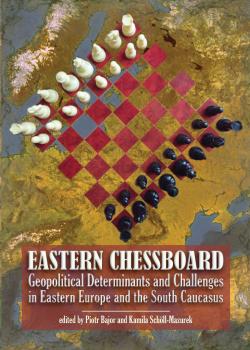Eastern Chessboard: Geopolitical Determinants and Challenges in Eastern Europe and the South Caucasus
Keywords:
Russian annexation of Crimea, Ukraine’s security, foreign policy, European identitySynopsis
What is going on east of the West becomes more and more important in today’s world. This book gives very good insight into the issue, especially what concerns Ukraine, Moldova and Armenia. Different countries, with different problems but one in common – Russian influence and tensions that it generates. […] Good book conceived by good team of authors from several countries, working together within a framework of well organized international research project.
Ph. D. Marek Czajkowski
Chapters
-
TABLE OF CONTENTS
-
Introduction .......... 7
-
Narrowing the Gap: Convergence of German and Polish Public Attitudes towards the Russian-Ukrainian Conflict .......... 9
-
Strength and power – conditions and doctrinal assumptions of the security policy of the Russian Federation .......... 29
-
An assessment of the Eastern Partnership in view of Ukrainian crisis 2013 .......... 41
-
Ukraine’s Geopolitical Choice: Historical Aspects .......... 63
-
Post-Soviet Ukraine’s war for independence, memory and identity .......... 71
-
“Frozen” Conflicts on the Territories of Countries Participating in “Eastern Partnership” As a Toll of Russian Influence in the Region .......... 83
-
Changes in the European System of International Relations due to the “Ukrainian Crises” of 2014-15 .......... 89
-
Coup d’État vs. Revolution: The Scopes of Regime Change Legitimacy in Ukraine during and after the Euromaidan and before the Annexation of Crimea .......... 103
-
Chinese perspectives and discussions on Ukraine Crisis .......... 111
-
When geopolitics hinders transformation – the impact of geopolitical games on social-economic development in Ukraine .......... 131
-
Europeanization Postponed: The Role of Veto Players in Shaping Convergence With The EU’s Conflict Resolution and Internal Market Integration Policies in Moldova and Georgia .......... 143
-
The Meaning of Geopolitical Factors in the Development of the State of Moldova in 2014 and 2015 .......... 157
-
The European Union’s external democracy promotion in the countries of the Southern Caucasus. Armenia, Azerbaijan and Georgia between the European Union and Russia .......... 175
-
Post Vilnius Armenia – Still Sitting on the Fence? .......... 197
-
How to Deal with Armenia’s Geopolitical Trilemma? Examining Public Opinion .......... 209
-
Armenian Leadership (Political and Party Elite) Stance on State’s Foreign Policy Orientation .......... 221
-
Economic Relations between Armenia and the EU within the framework of Eastern Partnership .......... 231
-
Armenia’s foreign policy between European identity and Eurasian integration .......... 247
Downloads
References





